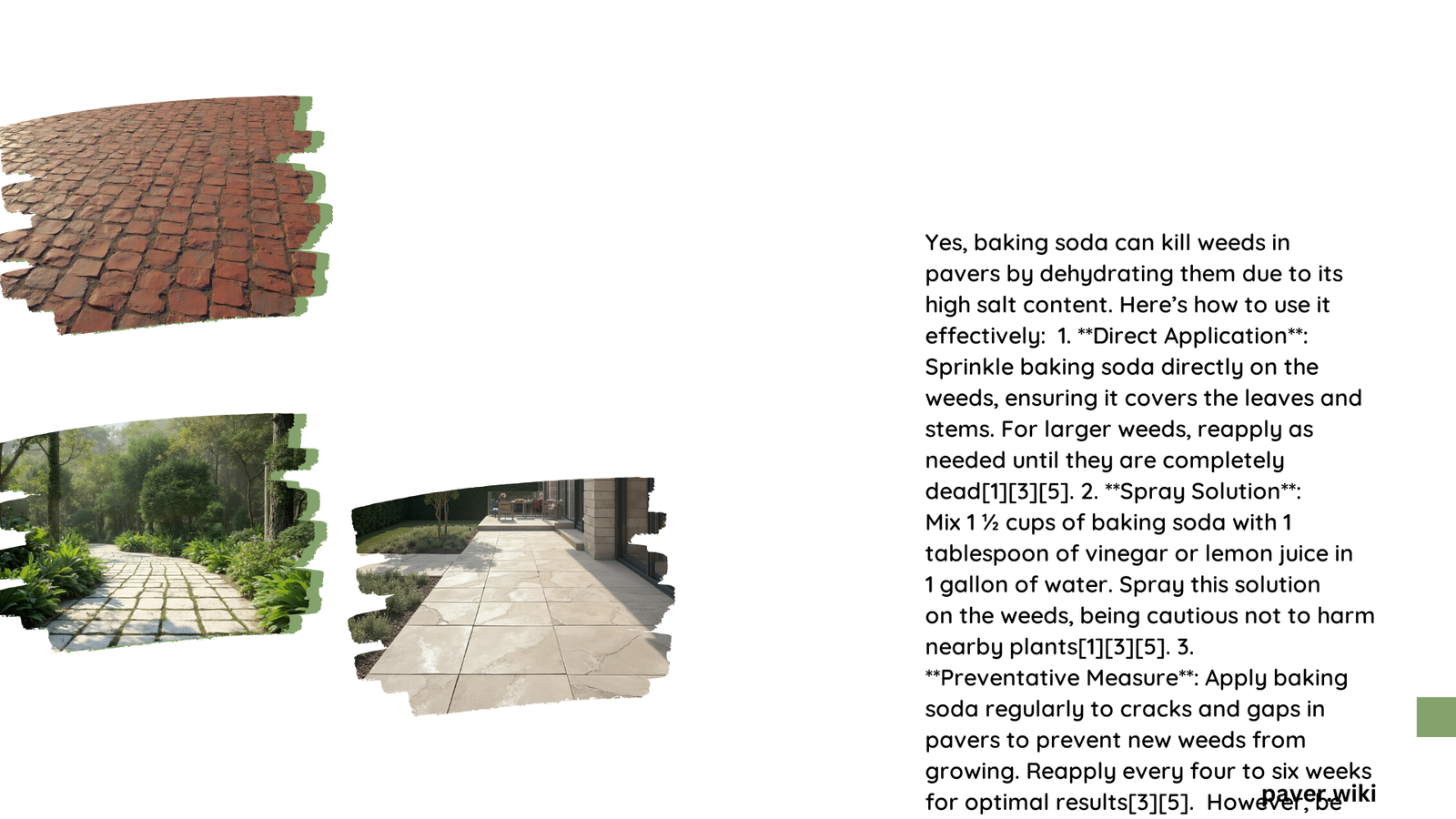Baking soda is an effective natural weed killer for pavers. It works by dehydrating plant tissues and roots, making it particularly useful for weeds growing in cracks and crevices. This common household item is most effective on small, young weeds and broadleaf varieties like dandelions, crabgrass, and clover. When applied correctly, baking soda can be a safe and eco-friendly alternative to chemical herbicides for maintaining weed-free paver surfaces.
How Does Baking Soda Kill Weeds?
Baking soda, or sodium bicarbonate, acts as a desiccant when applied to weeds. It draws out moisture from plant cells, causing them to dry out and die. This process is particularly effective on young, tender weeds that haven’t established deep root systems.
What Makes Baking Soda Effective Against Weeds in Pavers?
- High salt content
- Dehydrating properties
- Ability to penetrate small cracks and crevices
What Are the Best Methods to Apply Baking Soda on Pavers?

There are two primary methods for applying baking soda to kill weeds in pavers:
- Direct Application Method
- Sprinkle dry baking soda directly onto weeds
- Use approximately 1 teaspoon per weed
-
Wet the foliage first to help baking soda adhere
-
Solution Method
- Mix 1 tablespoon of baking soda with 1 cup of water
- Pour into a spray bottle
- Apply directly to weeds
When Is the Best Time to Apply Baking Soda?
For optimal results, apply baking soda:
- On sunny days
- When temperatures are above 85°F (30°C)
- Avoid application before expected rainfall
What Concentration of Baking Soda Is Most Effective?
The effectiveness of baking soda as a weed killer depends on the concentration used. Here’s a table showing recommended concentrations for different application methods:
| Application Method | Baking Soda | Water | Optional Additives |
|---|---|---|---|
| Direct Application | 1 teaspoon per weed | N/A | N/A |
| Basic Solution | 1 tablespoon | 1 cup | N/A |
| Potent Solution | 1 ½ cups | 1 gallon | 1 tablespoon vinegar or lemon juice |
Are There Any Safety Concerns When Using Baking Soda on Pavers?
While baking soda is generally safe for use on pavers, there are some precautions to consider:
- Impact on Surrounding Plants
- Baking soda is non-selective and can harm or kill any plant it contacts
- Apply precisely to target weeds only
-
Cover nearby desirable plants to protect them
-
Application Precautions
- Use in well-ventilated areas
- Avoid inhaling baking soda dust
- Wear protective gloves and eyewear
-
Keep children and pets away from treated areas
-
Paver Material Considerations
- Generally safe for most paver materials
- Avoid excessive use to prevent potential discoloration or residue buildup
How Does Baking Soda Compare to Other Weed Control Methods for Pavers?
Baking soda offers several advantages over other weed control methods:
- Natural and Eco-friendly: Unlike chemical herbicides, baking soda is a natural substance with minimal environmental impact.
- Cost-effective: It’s an inexpensive option compared to commercial weed killers.
- Readily Available: Most households already have baking soda on hand.
- Versatile: Can be used in various applications beyond weed control.
However, it also has some limitations:
- Less Effective on Established Weeds: May require multiple applications for larger or more mature weeds.
- Short-term Solution: Does not prevent new weed growth like some chemical herbicides.
- Weather Dependent: Effectiveness can be reduced by rain or high humidity.
What Are Some Alternative Natural Weed Control Methods for Pavers?
While baking soda is effective, there are other natural weed control methods you can consider for your pavers:
- Vinegar Solution
- Mix equal parts white vinegar and water
- Spray directly on weeds
-
More effective on young weeds
-
Boiling Water
- Pour boiling water directly onto weeds
-
Particularly effective for weeds in cracks and crevices
-
Salt
- Sprinkle rock salt or table salt on weeds
-
Use cautiously as it can affect soil quality
-
Manual Removal
- Pull weeds by hand or use a weeding tool
-
Most effective when soil is moist
-
Corn Gluten Meal
- Acts as a pre-emergent herbicide
- Prevents weed seeds from germinating
How Can You Prevent Weed Growth in Pavers Long-term?
While baking soda and other methods can kill existing weeds, preventing their growth is key to maintaining weed-free pavers:
- Proper Paver Installation
- Ensure a solid base layer and proper compaction
-
Use quality sand between pavers
-
Regular Maintenance
- Sweep pavers regularly to prevent soil accumulation
-
Refill joints with polymeric sand periodically
-
Sealant Application
- Apply a paver sealant to prevent weed seed germination
-
Reapply every 3-5 years or as recommended
-
Landscape Fabric
- Install landscape fabric beneath pavers during installation
- Creates a barrier against weed growth
By combining these preventive measures with spot treatments using baking soda or other natural methods, you can effectively manage and prevent weed growth in your paver surfaces.
References:
1. The Spruce: Baking Soda Makes a Great DIY Weed Killer—Here’s How to Use It
2. World of Stones USA: 5 Ways to Prevent Weed Growth Between Paving Stones
3. Ideal Home: Does baking soda kill weeds? Yes, but experts urge you to think …
